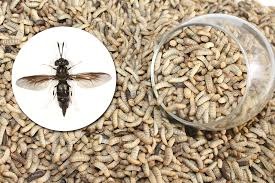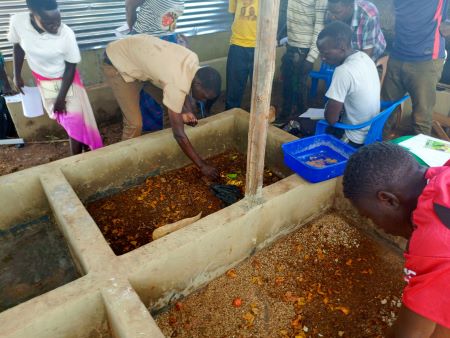HeadlineNews.News Feature: Black Soldier Fly (BSF) Farming in Nigeria — Real Potential, Real Challenges
Overview & Opportunity
Black Soldier Fly (Hermetia illucens) farming turns organic waste into high-value outputs—protein-rich larvae for animal feed, biofertilizer (frass), chitin, fat/oil—and even industrial applications like pharmaceuticals or water treatment.
Nigeria has enormous potential: estimates place the insect-based feed sector at between US$250 million and US$1.2 billion by 2030 for Nigeria alone, and the global BSF larvae market could reach US$3.96 billion by 2033, with Nigeria aiming to capture a share of that. With larvae containing up to 67% protein, BSF could help offset high livestock feed costs, which account for up to 70% of farm expenses.

“About 75 per cent of fish feed in Nigeria are imported… this training marks the beginning of the development of sustainable business models with insects.” — Dr Debo Akande, CEO, IITA-BIP
“One of the main challenges in the livestock sector… high cost of feed… This will help grow the livestock industry, contribute to employment, improve food security and protect the environment.” — John Amole, Nigeria Project Lead, NGN (IITA)
Local Momentum & Youth Participation
There’s noticeable buzz among Nigerian youths and small-scale innovators—videos and social forums spotlight entrepreneurs pitching maggot farms and claiming significant earnings. One motivational clip claims “₦1,000,000 monthly from maggots production!” Forum posts report that BSF maggots can reduce feed costs by up to 70%, with protein content of 40–67%—figures that align with international data.
Farmers are beginning to share their own experiences:
“I hope that… we can, in time, produce BSF larvae in so large a quantity that we can sell to other fish farmers and poultry farmers alike.” — Zacchaeus Oluwafemi, Fish Farmer, Oyo State
“Participating in this work… greatly reduce[s] the cost of feed and improve[s] profitability.” — Bernard Ogar, Fish Farmer, Cross River State
While these claims are encouraging, they remain largely anecdotal. There are no widely published, audited income statements or validated Nigerian case studies, so treat the numbers as illustrative, not definitive.

Regional Comparison & Context
In Zimbabwe, a documented case shows a farmer earning US$70–80 per day (about US$2,100/month) selling maggots—a credible benchmark of what’s possible. That’s not fantasy; it’s grounded, tangible evidence. Nigerian entrepreneurs need similar verified examples to inspire confidence.
Strengths
- Ideal climate: Nigeria’s average 24–30°C temperature range suits BSF reproduction and growth.
- Massive organic waste supply: The country generates 0.65–0.95 kg per person per day—about 50 million tonnes annually, which can feed the BSF value chain.
- Rising demand: Expensive feed imports create strong demand for affordable, local alternatives.

Challenges
- Lack of regulation and standards for insect-based feeds could lead to food safety or export issues.
- Low awareness among conventional farmers and consumers—adoption remains niche.
- Weak R&D and financing: Most research is grassroots, with scarce funding and little institutional backing.
- Infrastructure gaps: Unreliable power supply hinders scaling.
Strategic Moves & Realistic Next Steps
- Anchor claims in data: Success stories should be backed by cost-to-income breakdowns and ROI figures.
- Highlight credible benchmarks: Zimbabwe’s documented results can guide realistic expectations.
- Focus on circular economy appeal: Promote how BSF turns waste into multiple revenue streams—feed, frass, oil, chitin.
- Leverage institutional programs: Efforts like the ASEF International-FIDAS Africa MoU, aiming to train 100,000 Africans (40,000 Nigerians) in the insect value chain, are vital for sector growth.
- Push policy and infrastructure: Develop standards, financing models, and power solutions to solidify the industry.

Why This Matters—Now
Nigeria’s youths aren’t just dreaming—they’re experimenting. BSF farming is innovative, sustainable, and increasingly viable. But it is not yet a guaranteed goldmine—just an emerging opportunity that requires discipline, regulation, and strategic investment to fulfil its promise.
“WE’VE CUT FEED COSTS BY UP TO 70% USING MAGGOT MEAL.” — Speaker in Nairaland thread
“NIGERIA IS EYEING A $3.96 BILLION BSF LARVAE MARKET BY 2033.” — The Nation (Nigeria)
The opportunity is real—innovation is underway—but success will come from scaling with evidence, not hype.






